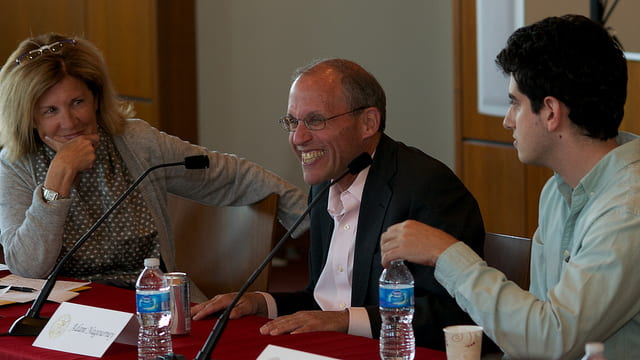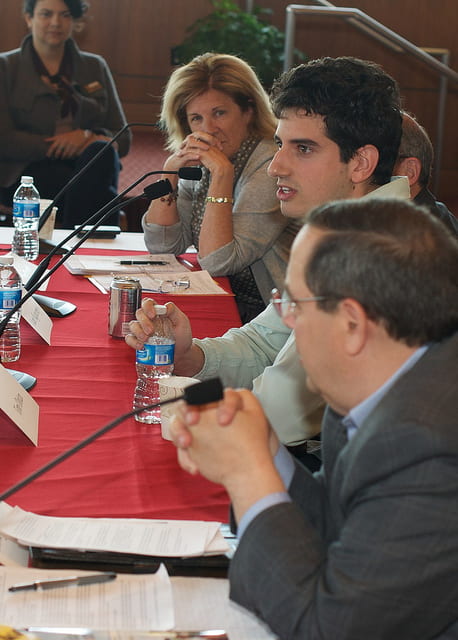 In collaboration with USC’s Bedrosian Center on Governance and the Public Enterprise and the Unruh Institute of Politics, CCLP hosted the most recent installment of the weekly Road to the White House speaker series yesterday. This week’s topic was “Politics, Media, and the Presidential Primaries after Super Tuesday.” The panel that led this discussion was moderated by CCLP senior fellow and former White House Senior Policy Advisor, Morley Winograd. He was joined by Tom Dotan, editor-at-large for Neon Tommy; Los Angeles Bureau Chief and former Chief National Political Correspondent for the New York Times Adam Nagourney; and finally by fellow senior fellow at CCLP, veteran political reporter Cinny Kennard, the former West Coast Chief for NPR and an award-winning CBS News correspondent and bureau chief. After an introduction by Managing Director Geoffrey Baum and a moment of remembrance for recent Road to the White House speaker, the late Andrew Breitbart, we got into a really engaging discussion on media, the Millennial Generation, and campaign politics.
In collaboration with USC’s Bedrosian Center on Governance and the Public Enterprise and the Unruh Institute of Politics, CCLP hosted the most recent installment of the weekly Road to the White House speaker series yesterday. This week’s topic was “Politics, Media, and the Presidential Primaries after Super Tuesday.” The panel that led this discussion was moderated by CCLP senior fellow and former White House Senior Policy Advisor, Morley Winograd. He was joined by Tom Dotan, editor-at-large for Neon Tommy; Los Angeles Bureau Chief and former Chief National Political Correspondent for the New York Times Adam Nagourney; and finally by fellow senior fellow at CCLP, veteran political reporter Cinny Kennard, the former West Coast Chief for NPR and an award-winning CBS News correspondent and bureau chief. After an introduction by Managing Director Geoffrey Baum and a moment of remembrance for recent Road to the White House speaker, the late Andrew Breitbart, we got into a really engaging discussion on media, the Millennial Generation, and campaign politics.
 The tip-off for this week’s conversation about the national political landscape in the wake of the results from Super Tuesday was Mr. Winograd’s assertion, outlined in his recent book Millennial Momentum (with Michael D. Hais), that America’s debates on civic ethos are on an 80-year cycle, and that this presidential election is taking place in the midst of the new debate. This idea has strong implications for the role of the Millennial Generation in the future of American politics, and especially in determining the size and purpose of the government in the lives of American citizens. Winograd believes that this election will be greatly influenced by “a fundamental and bitter conversation about the nature of America’s civic ethos.”
The tip-off for this week’s conversation about the national political landscape in the wake of the results from Super Tuesday was Mr. Winograd’s assertion, outlined in his recent book Millennial Momentum (with Michael D. Hais), that America’s debates on civic ethos are on an 80-year cycle, and that this presidential election is taking place in the midst of the new debate. This idea has strong implications for the role of the Millennial Generation in the future of American politics, and especially in determining the size and purpose of the government in the lives of American citizens. Winograd believes that this election will be greatly influenced by “a fundamental and bitter conversation about the nature of America’s civic ethos.”
Adam Nagourney led off, providing the media perspective that presidential candidates always call their election the most important election in history, and that they each had dramatically different ideas on the role of government. Nagourney also spoke to the important responsibility of journalists to balance coverage of both “the issues and the horse race.” He stressed the importance of maintaining mainstream media sources despite the influx of online ‘independent’ journalism because of mainstream’s ability to separate the wheat from the chaff through fact-checking.
Tom Dotan spoke next as a representative of both the media and the Millennial Generation, stating that there is not a lot of excitement among young voters about any of the Republican candidates. This point was driven home by Winograd’s report that only 5% of Super Tuesday’s votes were cast by people under 30. Dotan explained that the silliness of the horse race, especially the less-than-productive contributions of super PACs, are a turnoff for younger voters. Although Dotan believes that young voters are not excited about GOP candidates, he reminded us that the Obama administration has not been popular on internet freedom policies, making the point that a Republican candidate could gain momentum if he focuses on issues important to young voters.
Cinny Kennard entered the conversation by reminding us not to discount the influence of super PACs on the media, as they spent $4.5 billion on election media in 2010, almost half of which went directly to media coverage. This amount is unprecedented; she contends that it is difficult for reporters to “cover the issues when their editors are being paid to cover the horse race.” The outcome is that it is increasingly difficult to tell where candidates stand on issues because they’re not discussing the issues. She urges American voters and journalists to be mindful that brilliant strategists, like Stuart Stevens, David Axelrod and David Plouffe, are pushing stories to the media forefront for the purpose of engaging their target populations. The contraception issue, for example, didn’t become big news because of the decisions of Susan G. Komen Foundation in relation to Planned Parenthood; it became big news via that situation because campaigners felt that women were not fully engaged in the election. She recommends tools like factcheck.org and flackcheck.org to assist the general public in sorting through the media mess.
The panel’s closing remarks all spoke to the fact that we are still a long way from November, and that the race will only heat up. As networked populations continue to approach regional populations in power and influence, the parties and the media all need to be able change and adapt in order to keep a finger on the pulse of the American people.
This blog was contributed by Zhaleh Boyd, Masters in Public Diplomacy candidate.